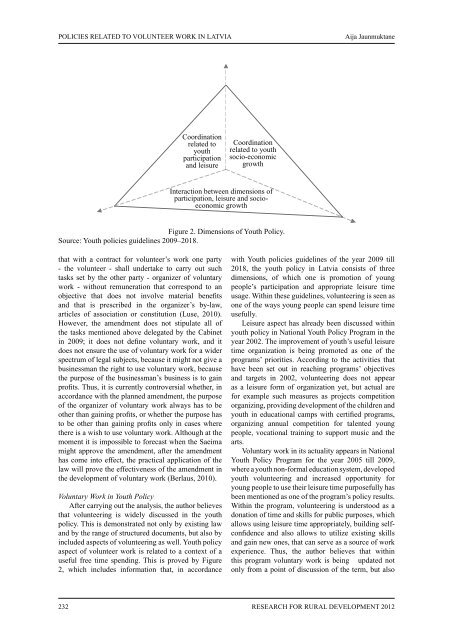RESEARCH FOR
RESEARCH FOR
RESEARCH FOR
Create successful ePaper yourself
Turn your PDF publications into a flip-book with our unique Google optimized e-Paper software.
POLICIES RELATED TO VOLUNTEER WORK IN LATVIA<br />
Coordination<br />
related to<br />
youth<br />
participation<br />
and leisure<br />
Interaction between dimensions of<br />
participation, leisure and socioeconomic<br />
growth<br />
that with a contract for volunteer’s work one party<br />
- the volunteer - shall undertake to carry out such<br />
tasks set by the other party - organizer of voluntary<br />
work - without remuneration that correspond to an<br />
objective that does not involve material benefits<br />
and that is prescribed in the organizer’s by-law,<br />
articles of association or constitution (Luse, 2010).<br />
However, the amendment does not stipulate all of<br />
the tasks mentioned above delegated by the Cabinet<br />
in 2009; it does not define voluntary work, and it<br />
does not ensure the use of voluntary work for a wider<br />
spectrum of legal subjects, because it might not give a<br />
businessman the right to use voluntary work, because<br />
the purpose of the businessman’s business is to gain<br />
profits. Thus, it is currently controversial whether, in<br />
accordance with the planned amendment, the purpose<br />
of the organizer of voluntary work always has to be<br />
other than gaining profits, or whether the purpose has<br />
to be other than gaining profits only in cases where<br />
there is a wish to use voluntary work. Although at the<br />
moment it is impossible to forecast when the Saeima<br />
might approve the amendment, after the amendment<br />
has come into effect, the practical application of the<br />
law will prove the effectiveness of the amendment in<br />
the development of voluntary work (Berlaus, 2010).<br />
Voluntary Work in Youth Policy<br />
After carrying out the analysis, the author believes<br />
that volunteering is widely discussed in the youth<br />
policy. This is demonstrated not only by existing law<br />
and by the range of structured documents, but also by<br />
included aspects of volunteering as well. Youth policy<br />
aspect of volunteer work is related to a context of a<br />
useful free time spending. This is proved by Figure<br />
2, which includes information that, in accordance<br />
Coordination<br />
related to youth<br />
socio-economic<br />
growth<br />
Figure 2. Dimensions of Youth Policy.<br />
Source: Youth policies guidelines 2009–2018.<br />
Aija Jaunmuktane<br />
with Youth policies guidelines of the year 2009 till<br />
2018, the youth policy in Latvia consists of three<br />
dimensions, of which one is promotion of young<br />
people’s participation and appropriate leisure time<br />
usage. Within these guidelines, volunteering is seen as<br />
one of the ways young people can spend leisure time<br />
usefully.<br />
Leisure aspect has already been discussed within<br />
youth policy in National Youth Policy Program in the<br />
year 2002. The improvement of youth’s useful leisure<br />
time organization is being promoted as one of the<br />
programs’ priorities. According to the activities that<br />
have been set out in reaching programs’ objectives<br />
and targets in 2002, volunteering does not appear<br />
as a leisure form of organization yet, but actual are<br />
for example such measures as projects competition<br />
organizing, providing development of the children and<br />
youth in educational camps with certified programs,<br />
organizing annual competition for talented young<br />
people, vocational training to support music and the<br />
arts.<br />
Voluntary work in its actuality appears in National<br />
Youth Policy Program for the year 2005 till 2009,<br />
where a youth non-formal education system, developed<br />
youth volunteering and increased opportunity for<br />
young people to use their leisure time purposefully has<br />
been mentioned as one of the program’s policy results.<br />
Within the program, volunteering is understood as a<br />
donation of time and skills for public purposes, which<br />
allows using leisure time appropriately, building selfconfidence<br />
and also allows to utilize existing skills<br />
and gain new ones, that can serve as a source of work<br />
experience. Thus, the author believes that within<br />
this program voluntary work is being updated not<br />
only from a point of discussion of the term, but also<br />
232 ReseaRch foR RuRal Development 2012


